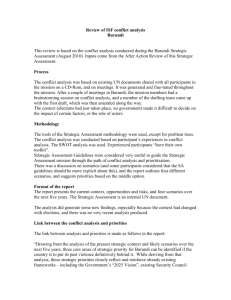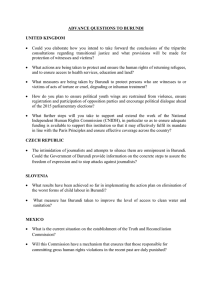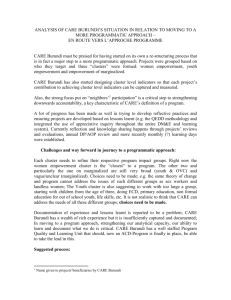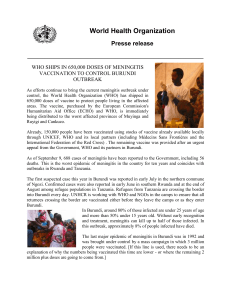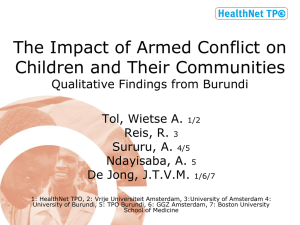Check against delivery Thirty-first session HUMAN RIGHTS COUNCIL
advertisement
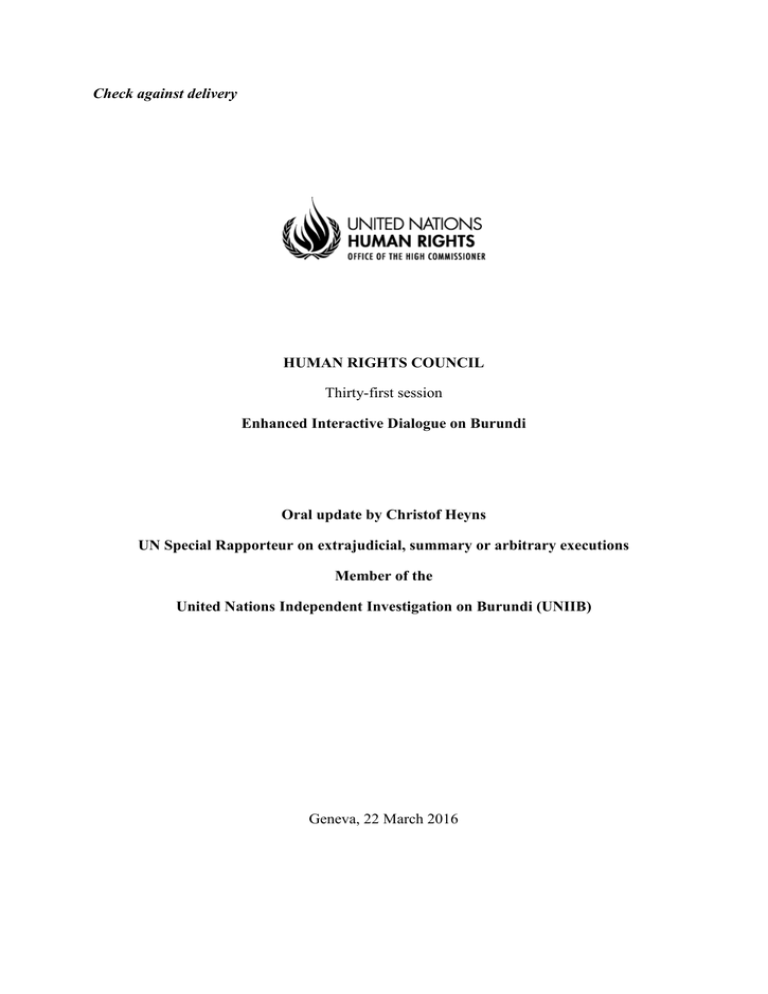
Check against delivery HUMAN RIGHTS COUNCIL Thirty-first session Enhanced Interactive Dialogue on Burundi Oral update by Christof Heyns UN Special Rapporteur on extrajudicial, summary or arbitrary executions Member of the United Nations Independent Investigation on Burundi (UNIIB) Geneva, 22 March 2016 Mr. President Excellencies, Ladies and Gentlemen, Background On 17 December 2015 the Human Rights Council at its twenty-fourth special session adopted Resolution A/HRC/S-24/L.1. The resolution: “Requests the United Nations High Commissioner for Human Rights to urgently organize and dispatch on the most expeditious basis possible a mission by independent existing experts: (a) To undertake swiftly an investigation into violations and abuses of human rights with a view to preventing further deterioration of the human rights situation; (…). (b) To have a representative of the experts issue an oral update and participate in an enhanced interactive dialogue on the human rights situation in Burundi at the thirty-first session of the Human Rights Council, and to issue a final report and participate in an enhanced interactive dialogue on the human rights situation in Burundi at the thirty-third session. The main focus of the Resolution is on the current or on-going crisis, which started in April 2015. The following experts were subsequently appointed by the High Commissioner to be members of the United Nations Independent Investigation on Burundi (UNIIB): - Mr Pablo de Greiff, UN Special Rapporteur on the promotion of truth, justice, reparation and guarantees of non-recurrence; - Ms Maya Sahli Fadel, Member of the African Commission on Human and Peoples’ Rights and Special Rapporteur on refugees, asylum seekers, internally displaced persons and migrants of the same institution; and - Mr Christof Heyns, UN Special Rapporteur on extrajudicial, summary or arbitrary executions. In a letter dated 11 January 2016 the High Commissioner informed the Permanent Mission of the Republic of Burundi in Geneva of the composition of the team, and set out the two phases of the mission: 1) two country visits, leading up to the report updating the Council on 21 March; and 2) two more visits and the deployment of nine human rights monitors in Burundi as from 1 April 2016, leading up to the final report to the Council in September. The Government of Burundi did not respond to the request for the first visit, which as a result did not take place. However, they subsequently responded and the second visit took place on 1 – 8 March 2016. During the visit the experts met with government officials, including the First Vice President, political leaders, civil society groups, and victims of human rights violations. They also visited the prison in Gitega and met with those convicted for involvement in the failed coup d’état in May 2015. Initial impressions 2 The visit was the first step in on-going process, and it is only possible to give general impressions at this stage. It should be stated at the outset that in the long run the only sustainable solution to the current crisis will be one that is owned and implemented by Burundian society. The international community can help but ultimately cannot solve the crisis. The fact that the mission could take place, and the high level of access that the experts had to high-ranking officials should be recognised. The same applies to the access that the experts had to those imprisoned for the attempted coup d’état. The overt violence of last year seems to have subsided. At the same time, covert violence for example in the form of disappearances seems to have increased. There is cause for serious concern about the human rights situation in Burundi. The crisis is by no means over though it may be less visible. Evidence points towards extrajudicial, summary and arbitrary executions, torture and disappearances that have taken place during the crisis that can be attributed to the State, and in some cases also to the armed opposition. Freedom of expression and the space for civil society is under sustained and often violent pressure. This has led to or exacerbated a situation where socio-economic rights are routinely violated. Ethnic division has historically played a significant historical role. Government officials and other interlocutors insist that this has declined, but the current crisis has the potential to open up old wounds. The OHCHR Office in Burundi has documented some 500 people killed, 1 700 arbitrary arrests and detentions and 20 enforced disappearances since April 2015. This situation has pushed and is still pushing Burundians to found refuge in neighbouring countries. There were 252,529 such refugees on 21 March 2016, according to UNHCR. Despite the recent reopening of Radio Isanganiro and Radio-TV REMA, most of the private radios suspended following the May 2015 coup attempt are still not authorized to operate. According to interlocutors out of the 37 newspapers available in Burundi, only one is perceived as independent. The three TV networks currently functioning in Burundi are seen as close to the Government. Civil society organisations similarly suffer restrictions. A total of 10 national NGOs were ordered to suspend their activities until completion of a judicial inquiry process. The assets of a further three associations were frozen at the end of 2015. The fabric of society is seriously disrupted and there are high levels of fear and exasperation among the population. There are some in government who seem to be open to change; however, others are in denial that anything is wrong and to the extent that they admit problems they blame it on others. The judiciary and other instruments of the justice system lack the necessary institutional independence. It is impossible to ignore the history of violence in the region, where generation after generation has undergone the trauma of genocide followed by impunity. It seems clear that a central part of any effort to stop these cycles of violence will have to be the introduction of a system of accountability. Many actors call for an inclusive political dialogue as a precondition for change. This is clearly necessary, but a more stable security situation as well as a less repressive environment will be essential to allow this to happen. Conclusion 3 The one thing that can be said for certain about the human rights situation in Burundi is that improving it will require a lot of work. We found some government officials willing to entertain some of the required conversations, and a civil society courageously engaged despite the harassment and intimidation to which it has been subject now for a long time. But for the rest, wide differences characterize the stance of the government on the one hand and members of civil society on the other. Those differences do not pertain only to matters of interpretation – for instance, basic questions about political preferences, or questions about responsibility for the current state of affairs; they pertain also to questions of fact. Because the facts under dispute in this situation refer to lives, and to aspects of lives protected by fundamental rights, it is crucial to ascertain them in an indisputable manner; the victims have legal and moral rights to truth, justice, and reparation; society as a whole also has rights to non-recurrence. From a prudential perspective, no one’s interests are served by the uncertainty concerning the reality of the situation. In low trust environments, uncertainty about any aspect of conflict only serves to feed ‘rumour mills’ and thus fuel further fears. No one should underestimate the potential of fear in a context in which past experiences inevitably colours perceptions of present risks and future prospects The reliable establishment of facts is imperative, both because victims have a right to know what happened to their family members, and also as a basis for the reestablishment of social trust. At the heart of many of the problems in Burundi lie deficits in governance; there is no way to make up for such deficits unless the institutions of the state relate to citizens in a different way. The correlation between governance and trust is well established. This is a relationship that has the form of a virtuous cycle: trust and good governance feed one another. Unfortunately, the reverse is true as well: mistrust and poor governance give rise to negative feedback loops. While there may be some in government that wager that through force the crisis can be weathered, no one should forget that the aim of government should never be to stay in power at just any price, but to stay in power so as to exercise it legitimately. Establishing relations with citizens that manifest in every interaction respect for the status of citizens as rights holders, respect for the rule of law, and for democratic requirements of transparency and inclusiveness are essential requirements for resolving and not merely coping with the crisis. Burundi, following the Arusha Peace Agreements and the adoption of the Constitution in 2005 was on a trajectory that promised a sufficiently long period of peace to allow a first generation of Burundian parents to bring up their children in peace. Political leaders on every side must do their utmost to create the conditions under which this is possible. Burundians deserve it, and the future of the country in many ways depends upon that possibility. In the long run steps such as ensuring the greater independence of the judicial system; disarming the militias; installing civilian oversight of the security sector; and providing the security forces with the capacity and training to use less lethal weapons will be necessary. In the short term a number of important, concrete steps should be taken. The presence of human rights monitors, especially in Mutakura, Cibitoke, Nyakabiga, and Musaga, the four districts in Bujumbura most affected by the violence, will be essential. 4 The increase in the numbers of the African Union monitors from 32 to 100 is to be welcomed. Collaboration between the different monitoring missions will be important. The monitors should be allowed to perform their work in an unhindered way and their numbers should be increased. The space for civil society and political dissent should be enhanced. The persecution of members of civil society must stop. Government officials must stop inflammatory language that sows ethnic division. In fact they have the responsibility to encourage ethnic collaboration and to condemn human rights violations. The Government must engage in open and frank discussions with the Government of Rwanda to address security issues, and the management of the refugee crisis. Attacks such as those recently conducted in a random fashion when hand grenades were thrown into bars in Bujumbura, whether the attributable to the armed opposition or others, must stop. As the experts left Burundi, they learned that some of the people they met were subjected to possible reprisals. Some fled the country. This is deeply disconcerting. The Government should undertake to exercise due diligence to ensure that those who engage with the mission as well as other observers is not subjected to reprisals. The experts will endeavour to facilitate technical assistance to government and other players where appropriate. In this context it will be important to explore what can be done regarding the allegations of the existence of mass graves. This will be discussed with the relevant authorities, including the government and international organizations with capacity in this field. Way forward The independent experts proceed on the assumption that by allowing the March visit to take place the Government has accepted the two-stage approach advanced by the High Commissioner. The experts propose that the next visit will start on 13 June 2016. They envisage that as part of this package nine human rights monitors (three of which are support staff) be deployed as from 1 April 2016 in Bujumbura, and, if that does not materialize, in the neighbouring countries. It will be of great importance to finalize the dates for the next visit, and to ensure that the human rights monitors to be deployed on 1 April will be able to be fully functional from the start. The experts look forward to the continuation of its interaction with the Government of Burundi and other role players in a constructive manner. Thank you very much. 5
